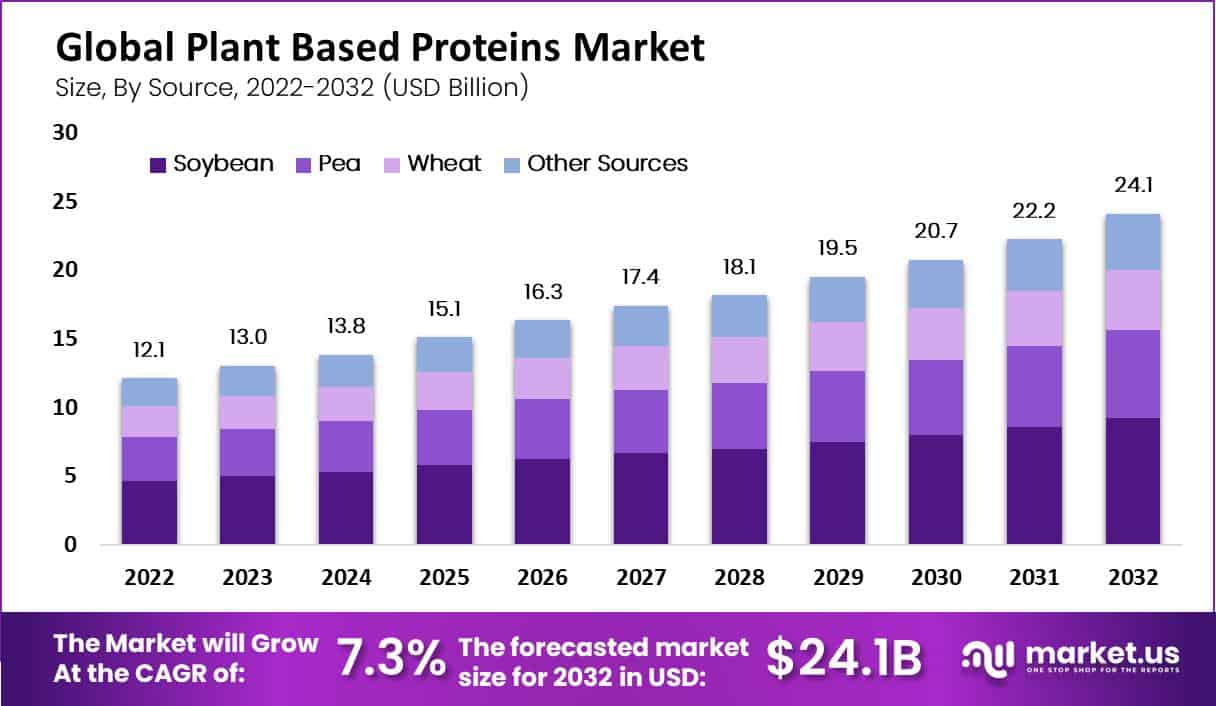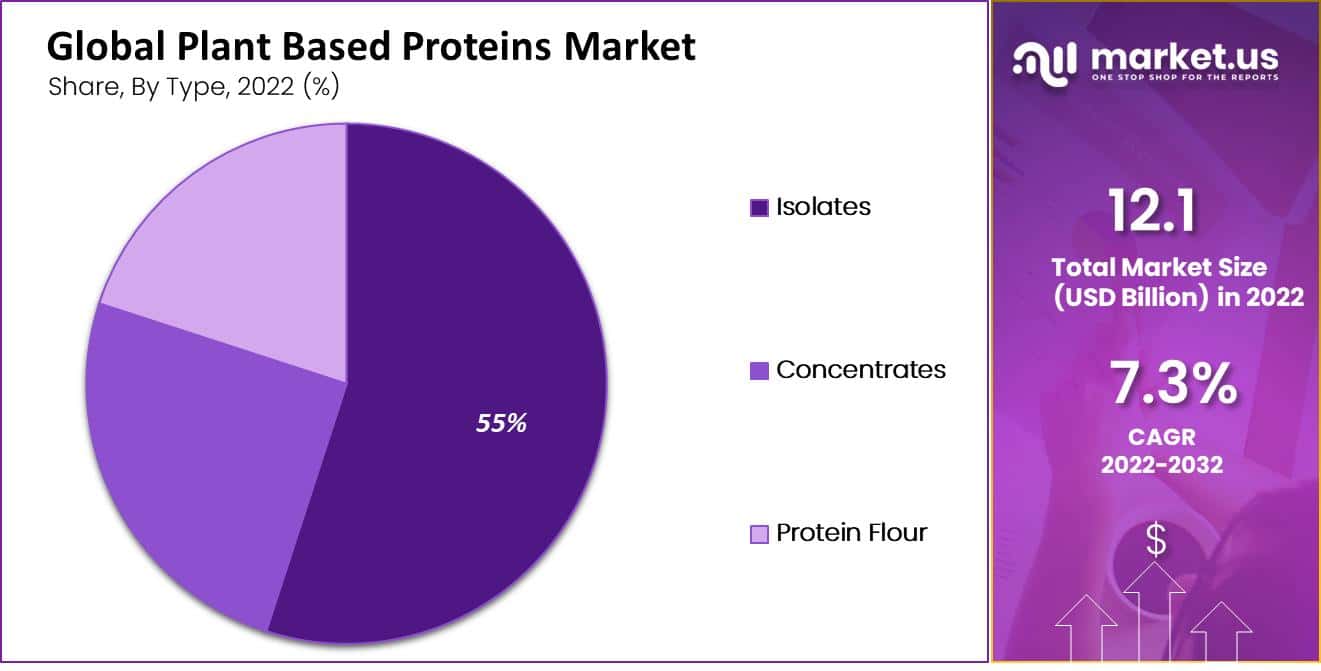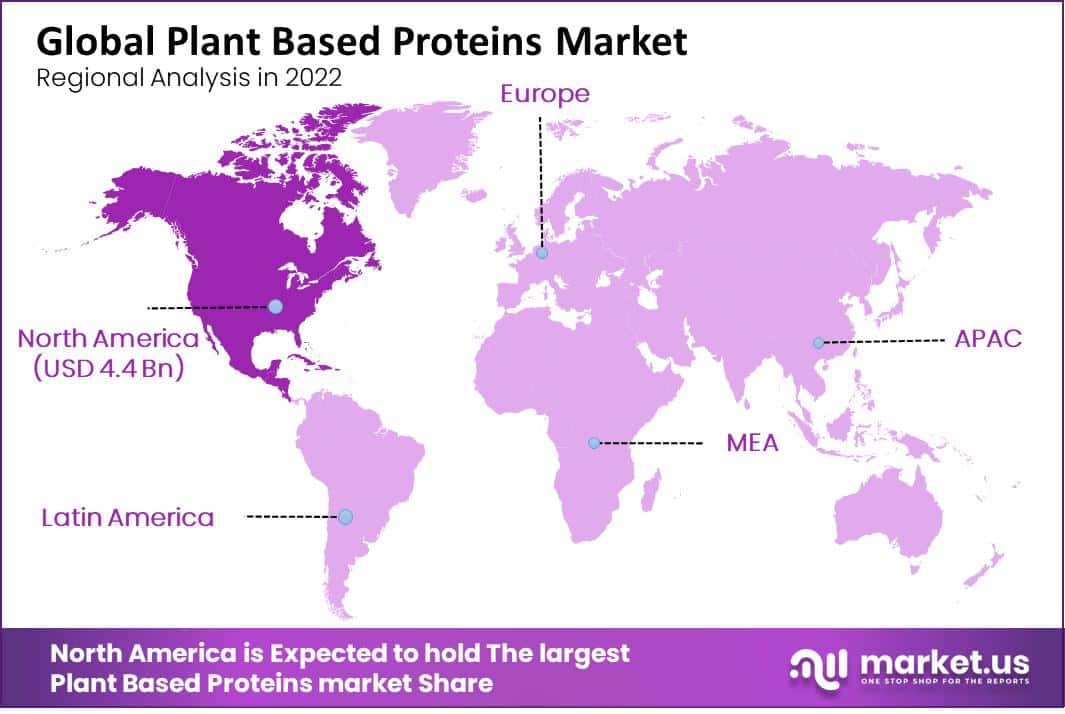Global Plant Based Proteins Market By Source (Soybean, Pea, Wheat, and Other Sources), By Type (Isolates, Concentrates, and Protein Flour), By Nature, By Application, By Region and Companies - Industry Segment Outlook, Mark Assessment, Competition Scenario, Trends, and Forecast 2023-2032
- Published date: Sep 2023
- Report ID: 100799
- Number of Pages: 278
- Format:
-
keyboard_arrow_up
Quick Navigation
Report Overview
In 2022, the global plant-based proteins market was valued at USD 12.1 Billion and is expected to reach USD 24.1 billion in 2032. This market is estimated to register the highest CAGR of 7.3 % between 2023 and 2032.
Plant-based proteins are the perfect option for animal-based proteins. These proteins are widely used across the world. The increasing health consciousness and consumer awareness of the nutritional values of food products are driving the growth of the plant-based protein market.
According to a study, people consuming plant-based foods are found to be less likely to have a heart-related disease than others. Due to this, a wide number of the population is shifting towards plant-based food products like proteins.
Also, the rising popularity of plant-based proteins among consumers is due to their benefits in obesity management. Obesity is a major issue in today’s world, and plant-based proteins can help in obesity management. These factors are boosting the growth of the plant-based protein market.
Many non-government organizations across the world are promoting the use of plant-based proteins due to their nutritional benefits over animal-based proteins. This is expected to drive the market growth of plant-based proteins.
These organizations are also working on animal welfare by promoting animal rights worldwide. These factors are expected to fuel the market growth of the plant-based proteins market.

Key Takeaways
- Market Growth: The global plant-based proteins market is on a significant growth trajectory. In 2022, it was valued at USD 12.1 billion, and it is projected to reach USD 24.1 billion by 2032, demonstrating a robust Compound Annual Growth Rate (CAGR) of 7.3%.
- Health-Conscious Shift: A growing health consciousness and awareness of nutritional value are driving the adoption of plant-based proteins. People are increasingly choosing plant-based options due to their perceived health benefits.
- Heart Health: Studies suggest that individuals consuming plant-based foods are less likely to develop heart-related diseases. This health benefit is a major factor behind the shift towards plant-based proteins.
- Obesity Management: Plant-based proteins are gaining popularity for their potential role in obesity management. With obesity being a global health concern, the market is benefiting from this trend.
- NGO Promotion: Non-governmental organizations (NGOs) advocating for animal welfare and animal rights are promoting plant-based proteins as a more ethical and sustainable choice, further fueling market growth.
- Allergies as a Restraining Factor: While plant-based proteins offer many benefits, some individuals may develop allergies to certain sources, such as soybeans. This factor is limiting the market’s growth.
- Soybean Dominance: Soybean is the leading source for plant-based proteins, owing to its amino acid richness and heart-healthy properties. It is widely used in the production of plant-based protein products.
- Isolates Lead: Among the types of plant-based proteins, isolates are the most popular. They are used in functional and nutritional foods and are especially favored for infant nutrition.
- Conventional vs. Organic: Conventional plant-based proteins are more widely available and cost-effective, while the trend toward organic foods is expected to drive the growth of organic plant-based proteins.
- Key Applications: Plant-based proteins find applications in various sectors, with nutrition and health supplements leading the market. The demand for these proteins in animal feed is also on the rise.
- Emerging Opportunity: Aquatic plant-based proteins are gaining attention as an emerging opportunity in the market. These proteins are rich in nutrients and have the potential to further drive market growth.
- Regional Leadership: North America is a dominant market for plant-based proteins, with 36.4% of global market revenue. The Asia-Pacific region is expected to exhibit the fastest growth rate, driven by a large population and increasing demand for plant proteins.
- Key Players: Major companies in the plant-based proteins market include Cargill Incorporated, Glanbia, Archer Daniels Midland Company, Kerry Group plc, Axiom Foods Inc, and others. These companies are expanding through collaboration, acquisitions, and partnerships.
Driving Factors
Rising Health Awareness and Promotion from NGOs are Driving the Growth of the Plant Based Proteins Market
The rising health consciousness among individuals around the world has shifted food preferences from animal-based food to plant-based food. The health concerns like heart-related diseases, cardiovascular diseases, and chronic diseases are forcing individuals to adopt a healthy lifestyle.
According to a study, it is found that individuals eating animal-based food are more likely to have heart-related diseases than the ones eating plant-based food.
These health-related concerns are driving the market for plant-based proteins market. Also, the increasing awareness of nutrition for the body is forcing individuals to consume proper nutritious and healthy food to maintain a healthy lifestyle. Due to this, many individuals have started to adopt plant-based proteins.
Many non-government organizations are working for animal welfare by promoting animal rights around the world. These organizations have been suggesting switching to plant-based proteins and food to avoid the killing of animals for animal-based proteins and food.
By doing so, these organizations are also promoting the use of plant-based proteins among individuals. This is boosting the growth of the plant-based protein market.
Restraining Factors
The Development of Allergies Among Individuals Due to Plant-based Proteins to Restrict the Growth of the Market
The plant-based proteins have many nutritional values and benefits over animal-based proteins. However, some individuals are allergic to plant-based proteins like soybeans. By consuming plant-based proteins, some individuals can develop allergic reactions to them.
Therefore, many individuals try to avoid plant-based proteins over animal-based proteins. This is obstructing the growth of the plant-based protein market.
By Source Analysis
Wide Usage of Soybean in the Production of Plant-Based Proteins to Drive the Market Growth
Plant-based proteins are classified into soybean, pea, wheat, and other sources on the basis of sources of protein. Out of these sources, the soybean dominates the market by covering a major share of the sources segment of the plant-based proteins market.
The growth of soybean in the sources segment is due to its wide usage as a raw material for producing plant-based proteins. Soybean is rich in amino acids and provides better health to the heart than animal-based proteins.
Therefore, soybean is mostly used as a raw material for the production of plant-based proteins. These factors are propelling the growth of the global plant-based proteins market.
After soybean, the pea is anticipated to grow significantly during the forecast period. The high nutritional profile of peas and the absence of allergens are expected to drive the growth of the pea as a source in the plant-based proteins market over the forecast period.
By Type Analysis
Isolate Type of Proteins Leads the Plant-Based Proteins Market
Based on type, plant-based proteins are classified into isolates, concentrates, and protein flour. Among these types, the isolate type of proteins contributes to the major share of the plant-based proteins market. It is anticipated to grow significantly over the forecast period.
Isolates are used in various functional foods and nutritional foods due to their high nutritional content. This is driving the growth of the isolates in the plant-based proteins market. Also, the infants are given plant-based proteins through isolates due to their healthy and digestible nature. These factors are boosting the growth of the plant-based protein market.

However, the concentrate type of proteins is expected to grow during the forecast period. The plant-based proteins like soybean protein concentrate pea protein concentrate wheat protein concentrate are in high demand across the world. This is anticipated to grow the market significantly over the forecast period.
By Nature Analysis
Conventional Plant-Based Proteins Dominate Over the Organic Plant-Based Proteins
Plant-based protein market is divided into organic and conventional on the basis of its nature. Among these, conventional proteins dominate over organic proteins due to their high availability around the world.
The conventional type of proteins is made from plants which are harvested by using fertilizers. This makes conventional proteins easily available in the market.
Moreover, factors like low cost, high nutritional content, longer shelf life, and easy availability are boosting the growth of conventional plant-based proteins in the market.
However, the rising trend of organic foods is expected to boost organic plant-based proteins to grow at the highest CAGR during the forecast period.
By Application Analysis
Plant-Based Proteins are Mainly Used in the Nutrition and Health Supplements.
Based on application, the plant-based proteins market is classified into food, bakery and confectionery, animal feed, pharmaceuticals, nutrition, health supplements, and other applications.
From these applications, nutrition and health supplements lead the market by accounting for a major revenue share. It is anticipated to grow at a healthy CAGR over the forecast period.
The rising health consciousness and awareness about balanced and nutritious diets are increasing the demand for plant-based proteins through nutritional and health supplements.
The increasing health-related problems in young individuals, and increasing awareness about plant-based proteins in nutrition and health supplements, are expected to propel the growth of the nutrition and health supplements in the plant-based proteins market.
The feed segment is also anticipated to grow at a significant rate during the forecast period. The rising use of plant-based proteins like soybean proteins, pea proteins, and wheat proteins in the feed products of animals is propelling the growth of the feed segment in the plant-based proteins market.
Market Key Segments
By Source
- Soybean
- Pea
- Wheat
- Other Sources
By Type
- Isolates
- Concentrates
- Protein Flour
By Nature
- Organic
- Conventional
By Application
- Food
- Bakery & Confectionery
- Animal Feed
- Nutrition & Health Supplements
- Pharmaceuticals
- Other application
Growth Opportunity
The Development of Aquatic Plant-Based Proteins is Expected to Create Many Opportunities in the Market
The increasing health awareness among individuals is forcing them to adopt plant-based proteins in their diet. With changing lifestyles, the health consciousness in individuals is increasing the consumer demand for plant-based proteins in the market.
To meet this demand for plant proteins, many major companies are focusing on the development of proteins from aquatic plants as the source.
The key companies are heavily investing in the development of aquatic plant-based proteins to increase their sales and expand their business around the world. Aquatic plant-based proteins have been found to possess a huge amount of proteins and ingredient content.
This is why aquatic plant-based proteins are anticipated to create many opportunities in the plant-based proteins market to propel the growth of the market.
Latest Trends
The Rising Popularity of Vegan Products is Anticipated to Boost the Plant-Based Proteins Market
The religious considerations of food preferences among many individuals around the world are switching the food preferences of such people from animal-based proteins to plant-based proteins. This trend of switching to plant-based proteins from animal-based proteins is fuelling the growth of the plant-based proteins market.
Also, the rising popularity of vegan food products in many individuals is switching the preferences of individuals from animal-based proteins to plant-based proteins. The plant-based proteins are said to contain all the essential nutrients required for the human body.
This promotes the individuals to adopt plant-based proteins in their diet. These key trends are expected to fuel the growth of the plant-based proteins market during the forecast period.
Regional Analysis:
North America Leads the Plant-Based Proteins Market by Covering Major Revenue Share.
North America dominates the market by accounting for a major revenue share of 36.4% in the global plant-based proteins market. The increasing consumption of proteins in health clubs and gyms due to rising health consciousness and health concerns like obesity and the urge to get fitter is driving the growth of the plant-based proteins market in North America.
The increasing number of individuals switching to vegan diet products in countries like the United States and Canada are adopting plant-based proteins in their diets. Moreover, the presence of major companies in the production of plant-based proteins in North America is boosting the growth of the plant-based proteins market in North America.

The Asia Pacific region is anticipated to grow at the fastest CAGR through the forecast period. The presence of a huge population in religious considerations for vegan food products in the Asia Pacific region is driving the growth of the plant-based proteins market in the Asia Pacific region.
Also, after the COVID-19 pandemic, the Asia-Pacific region has seen significant growth in the demand for plant proteins. These major factors are expected to propel the growth of the plant-based proteins market in the Asia Pacific region over the forecast period.
Key Regions and Countries
- North America
- The US
- Canada
- Mexico
- Western Europe
- Germany
- France
- The UK
- Spain
- Italy
- Portugal
- Ireland
- Austria
- Switzerland
- Benelux
- Nordic
- Rest of Western Europe
- Eastern Europe
- Russia
- Poland
- The Czech Republic
- Greece
- Rest of Eastern Europe
- APAC
- China
- Japan
- South Korea
- India
- Australia & New Zealand
- Indonesia
- Malaysia
- Philippines
- Singapore
- Thailand
- Vietnam
- Rest of APAC
- Latin America
- Brazil
- Colombia
- Chile
- Argentina
- Costa Rica
- Rest of Latin America
- Middle East & Africa
- Algeria
- Egypt
- Israel
- Kuwait
- Nigeria
- Saudi Arabia
- South Africa
- Turkey
- United Arab Emirates
- Rest of MEA
Key Players Analysis
The global plant-based protein market is fragmented into many key companies around the world. These companies are adopting various strategies like collaboration, acquisition, partnership, and mergers to expand their business across the world.
Some of the key players in the plant-based proteins market are Cargill Incorporated, Glanbia, Archer Daniels Midland Company, Kerry Group plc, Axiom Foods Inc, A&B Ingredients, Vestkorn Milling AS, Royal Ingredients Group, Quest Nutrition, Now Health Group Inc, etc.
Key Players
- Cargill Incorporated
- Archer Daniels Midland Company
- Glanbia
- Axiom Foods Inc
- Kerry Group plc
- A&B Ingredients
- Aminola
- Royal Ingredients Group
- Vestkorn Milling AS
- Now Health Group Inc
- Quest Nutrition
- Other Key Players
Recent Developments
- In July 2022, Roquette launched its new product range NUTRALYS. It is a range of organic nature proteins derived from fava and peas for the Europe region market.
- In April 2022, Cargill Incorporated announced the expansion of their product Radipure pea protein for the Middle East, Africa, India, and Turkey markets to fulfill the increasing demand for pea proteins in these regions.
Report Scope
Report Features Description Market Value (2022) USD 12.1 Bn Forecast Revenue (2032) USD 24.1 Bn CAGR (2023-2032) 7.3% Base Year for Estimation 2022 Historic Period 2016-2022 Forecast Period 2023-2032 Report Coverage Revenue Forecast, Market Dynamics, COVID-19 Impact, Competitive Landscape, Recent Developments Segments Covered By Source – Soybean, Pea, Wheat, and Other Sources; By Type – Isolates, Concentrates, and Protein Flour; By Nature – Organic and Conventional; By Application – Food, Bakery and Confectionery, Animal Feed, Pharmaceuticals, Nutrition, and Health Supplements, And Other Application. Regional Analysis North America – The US, Canada, & Mexico; Western Europe – Germany, France, The UK, Spain, Italy, Portugal, Ireland, Austria, Switzerland, Benelux, Nordic, & Rest of Western Europe; Eastern Europe – Russia, Poland, The Czech Republic, Greece, & Rest of Eastern Europe; APAC – China, Japan, South Korea, India, Australia & New Zealand, Indonesia, Malaysia, Philippines, Singapore, Thailand, Vietnam, & Rest of APAC; Latin America – Brazil, Colombia, Chile, Argentina, Costa Rica, & Rest of Latin America; the Middle East & Africa – Algeria, Egypt, Israel, Kuwait, Nigeria, Saudi Arabia, South Africa, Turkey, United Arab Emirates, & Rest of MEA Competitive Landscape Cargill Incorporated, Glanbia, Archer Daniels Midland Company, Kerry Group plc, Axiom Foods Inc, A&B Ingredients, Vestkorn Milling AS, Royal Ingredients Group, Quest Nutrition, Now Health Group Inc, and Other Key Players Customization Scope Customization for segments, region/country-level will be provided. Moreover, additional customization can be done based on the requirements. Purchase Options We have three licenses to opt for: Single User License, Multi-User License (Up to 5 Users), Corporate Use License (Unlimited User and Printable PDF) Frequently Asked Questions (FAQ)
What will be the market size for plant-based proteins Market in 2032?In 2032, the plant-based proteins Market will reach USD 24.1 billion.
What CAGR is projected for the plant-based proteins Market?The plant-based proteins Market is expected to grow at 7.3% CAGR (2023-2032).
Name the major industry players in the plant-based proteins Market.Cargill Incorporated, Archer Daniels Midland Company, Glanbia, Axiom Foods Inc, Kerry Group plc, A&B Ingredients and Aminola and Other Key Players are the main vendors in this market.
List the segments encompassed in this report on the plant-based proteins Market?Market.US has segmented the plant-based proteins Market Market by geographic (North America, Europe, APAC, South America, and MEA). By Source, market has been segmented into Soybean, Pea, Wheat and Other Sources. By Type, the market has been further divided into, Isolates, Concentrates and Protein Flour.
 Plant Based Proteins MarketPublished date: Sep 2023add_shopping_cartBuy Now get_appDownload Sample
Plant Based Proteins MarketPublished date: Sep 2023add_shopping_cartBuy Now get_appDownload Sample -
-
- Cargill Incorporated
- Archer Daniels Midland Company
- Glanbia
- Axiom Foods Inc
- Kerry Group plc
- A&B Ingredients
- Aminola
- Royal Ingredients Group
- Vestkorn Milling AS
- Now Health Group Inc
- Quest Nutrition
- Other Key Players










